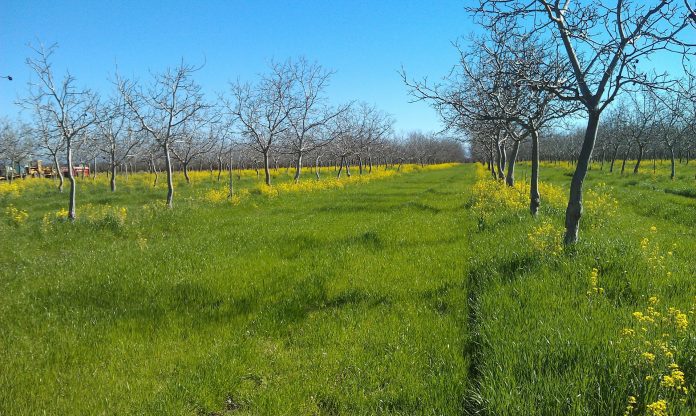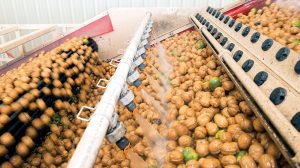
Handlers, processors and importers of organic tree nuts face additional auditing requirements under the USDA’s Strengthening Organic Enforcement standards now in effect. But for organic farmers, the new rule may not have much effect.
New traceability requirements in particular place additional burdens on handlers, processors and importers to ensure tree nuts meet organic standards as they make their way through the supply chain from farm to consumer.
The new rule, said to be the biggest change in organic standards in 20 years, was brought forward by the National Organic Program to eliminate fraudulent organic sales and bolster consumer confidence in the USDA organic seal. The rule was finalized in March, and changes must be implemented by March 2024.
“This has the impact where the impact is most needed in terms of risk, and those are those longer supply chains,” said Jennifer Tucker, deputy administrator for the USDA’s National Organic Program, in an interview with West Coast Nut.
The new Strengthening Organic Enforcement rule has its origin in the 2018 Farm Bill, which called on the USDA to tighten organic rules. Tucker noted the USDA Agricultural Marketing Service, which administers the National Organic Program, already was working behind the scenes on addressing the issue.
“We had already started writing a rule to strengthen the regulations and the Farm Bill gave us a lot of additional authority and tools to do that, which was great,” Tucker said. “That allowed us to fold in recommendations from our Advisory Board, requirements from Congress and experiences that we had gained in actual investigations over time.”
Tucker added news stories of organic fraud, particularly related to imports, further spurred officials to work on strengthening the rule.
“That has been a big focus for us in the last five to six years,” she said. “In addition to the rule itself, we’ve also built very strong relationships with Customs and Border Protection.”
Traceability Audits
Among several changes to existing standards, the new rules require more links in the supply chain to be certified organic and requires operations conduct traceability audits, requirements put in place to address loopholes in increasingly complex supply chains.
“When the organic regulations were originally written, they didn’t anticipate necessarily all of that complexity,” Tucker said. “So, really, this is a rule that is focused on continuous improvement to make sure the rules are protecting the organic market as it grows.
“As an industry grows and there are financial opportunities, there are also opportunities for bad actors to come in and try and make money while not following the rules,” Tucker said. “And there have been stories of fraud and incidences of fraud in the organic market. So, we have learned over the last several years the types of protections that are needed to deter that fraud. And this is very much a risk-based, risk-aware rule and it places most of the new burdens on the parts of the supply chain that have the higher risk.”
Organic tree nut growers said they welcome the changes.
“I’ve heard stories of people who abuse the system, so this will help those who follow the organic regulations,” said James Nichols of Nichols Farms in Hanford, Calif., which grows organic pistachios.
Glenn Anderson of Anderson Almonds, one of the first farms to produce organic almonds in California, said he agreed that new rules are needed to crack down on imposters in the organic marketplace. “We were there at the table when the first organic standards were being drafted,” Anderson said. “Tightening things up I think is totally in order, because there are going to be people trying to leapfrog the requirements and get themselves to where there’s some profit in this depressed almond market right now.”
Closing Loopholes
Connie Karr, certification director for Oregon Tilth, which certifies organic operations across the U.S., said she believes the new rules add safeguards against fraud in the organic marketplace by closing loopholes that have been exploited in the past.
“This is requiring a lot more people to become certified,” Karr said. “It is closing some of those loopholes in the exemptions on who has to be certified in the organic supply chain.”
“I think the rule does the right things in the right places to protect the farmers that are playing by the rules and discouraging imposters,” Tucker said. “Requiring things like mass-balance exercise and supply-chain traceability will be an important deterrent against fraud in the domestic market as well as in the international market.”
Organic farmers won’t be particularly affected by the new traceability requirements, Tucker said, in large part because of their position in the supply chain.
“The earlier you are in the supply chain, the less worried you need to be about traceability,” Tucker said. “It’s really about traceability from the market back to farm. So, if you’re at the farm, you’re the one who’s producing the product, you need to make sure that any suppliers you are working with are organic and following the rules. But, at the beginning of the supply chain, you don’t have as much responsibility looking backwards because there is not much in back of you.”
Among changes highlighted by the National Organic Program, the rule requires on-farm audits once every calendar year, a change in language from the past rule, which required annual audits. Growers and certifiers said they don’t expect that to have much effect on their operations.

The new rule also increases training requirements for certifiers, requiring on-farm auditors have 2,000 hours of relevant experience before being eligible for the training, a requirement that could make it difficult for certifiers to find qualified auditors.
“This is a very significant change for certifiers, absolutely,” Karr said.
The new traceability requirements also will require certifiers to spend more time auditing operation, Karr said, which could lead to increased costs for the certifications, costs which may get passed to farmers.
“I think overall, we will see costs of certification potentially going up. Definitely the time and cost of the inspection will increase,” Karr said.
It is the middle of the supply chain, however, the brokers and handlers, that will bear the biggest burdens in implementing the changes, Tucker said. “Most of the costs of the rule are going to be for new certifications in the middle of the supply chain, so these handlers and brokers that are moving product from point A to point L, and on the import certificates, the cost of generating the import certificates and the oversight that that requires. Because it’s not just clicking a button to generate your certificate. It’s making sure that due diligence has happened.”










